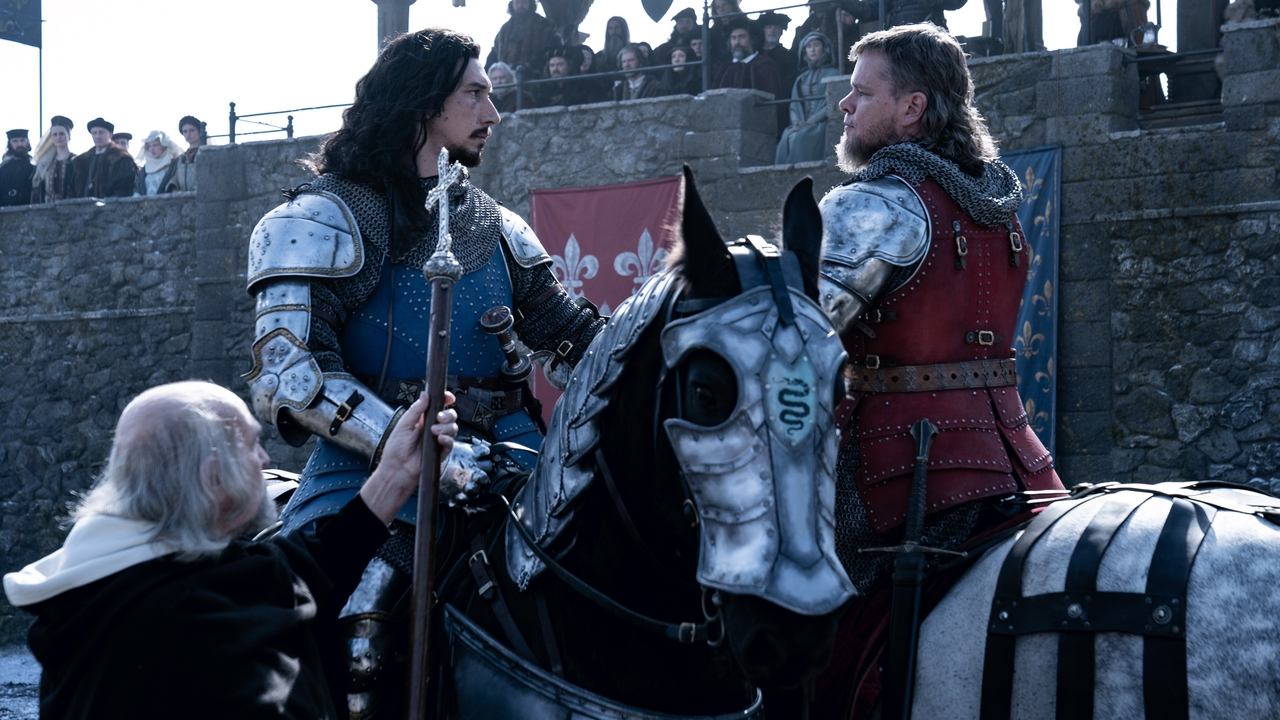Reviewed by GREG KING
Director: Ridley Scott
Stars: Matt Damon, Adam Driver, Jodie Comer, Ben Affleck, Harriet Walter, Marton Csokas, Zeljko Ivanek, Alex Lawther, Clare Dunne, Clive Russell, William Houston, Nathaniel Parker.

Acclaimed director Ridley Scott made his directorial debut 44 years ago with the visually sumptuous The Duellists. Set during the Napoleonic era, the drama starred Harvey Keitel and Keith Carradine as a couple of lieutenants in the French army who fought several duels over the course of many years. The film established Scott’s reputation as a stylish filmmaker. And at the age of 83 the prolific filmmaker shows little signs of slowing down, and there seems to be a certain symmetry with his latest film, the historical epic The Last Duel, which takes us back to medieval France at the tail end of the fourteenth century.
Heroic knight Jean de Carrouges (Matt Damon) has fought alongside his friend Jacques Le Gris (Adam Driver) in wars, but they have a falling out after Le Gris finds favour in the court of the rich and powerful Pierre d’Alencon (Ben Affleck), one of the wealthiest barons in the land. Pierre appoints Jacques as his personal accountant charged with collecting levies for the promulgation of the ongoing wars, and rewards him handsomely with property and prestige. Jean finds his finances depleted, and, deeply in debt he marries Marguerite (Jodie Comer, from the tv series Killing Eve and the recent Free Guy, etc), the daughter of a pardoned traitor, to restore his finances. But his demands for a parcel of land as part of the dowry bring him into conflict with Jacques, and there follows several unsuccessful attempts to sue.
When Carrouges is sent to Scotland to prosecute a war on behalf of King Charles VI (Alex Lawther), Jacques takes advantage of his absence to approach Marguerite. He feels that Jean doesn’t deserve her, and he has his way with her in her bedchamber. She claims Jacques raped her which leads to a hearing. Carrouges demands satisfaction through a duel to restore his honour, but Pierre refuses to countenance such action. Carrouges takes his appeal all the way to the king, and is granted leave to face Jacques in a duel. If Carrouges wins the duel he will be vindicated; if he loses he will be dead and Marguerite will be burned at the stake for giving false witness. The trial also turns into a test of Marguerite’s veracity as her integrity is also questioned.
Their duel between the two men became the last legally sanctioned trial by combat held in France.
The film is based on the 2004 nonfiction book The Last Duel: A True Story Of Crime, Scandal and Trial by Combat In Medieval France, which was impeccably researched and written by Eric Jager. The book has been adapted to the screen by Damon and Affleck – this is their first screenwriting collaboration since the Oscar winning Good Will Hunting in 1997. They have collaborated with filmmaker Nicole Holofcener, who brings colour, bite and a strong contemporary female perspective to the material. The script also explores potent themes of loyalty and betrayal, revenge, justice, truth and perspective, court intrigues, politics and religion, sexual violence and the treatment of women. The Last Duel unfolds in three chapters, each of which replays key events from the different perspectives of the three main characters, which add more detail and insight to the story.
Damon brings a suitably dour demeanour to his performance as Carrouges and he portrays him as a flawed man, petty and desperate for respect. Driver has a strong presence in the role of the vain, arrogant and scheming le Gris, a role that was originally intended for Affleck before a scheduling conflict forced him to step back into a secondary role. Affleck seems to be having a ball as the cheerfully decadent d’Alencon. Comer brings plenty of emotion and nuances to her performance as Marguerite, who slowly evolves from dutiful wife to rape victim to a woman determined to make the truth known. She is arguably the strongest, both morally and physically, of the three characters depicted here.
As is to be expected from a filmmaker of Scott’s calibre and resume, this is a handsomely mounted production with superb production design from Arthur Max that immerses us in a France ravaged by poverty, war and the plague, and stunningly authentic costumes from Janty Yates. The film has been beautifully shot on locations ranging from Ireland to a real-life castle in France by regular cinematographer Dariusz Wolski (The Martian, etc), who uses a suitably grim and greyish colour palette that gives the material a gritty texture. Interior sequences seem to be lit by candle light, giving them a golden hue. As with Scott’s Gladiator, the titular duel itself is quite brutal and bloody and superbly choreographed.
However, the film’s running time of 152 minutes seems a little bloated given Scott’s deliberately measured pacing, and the three-chapter narrative structure allows for a bit too much repetition.
★★★



